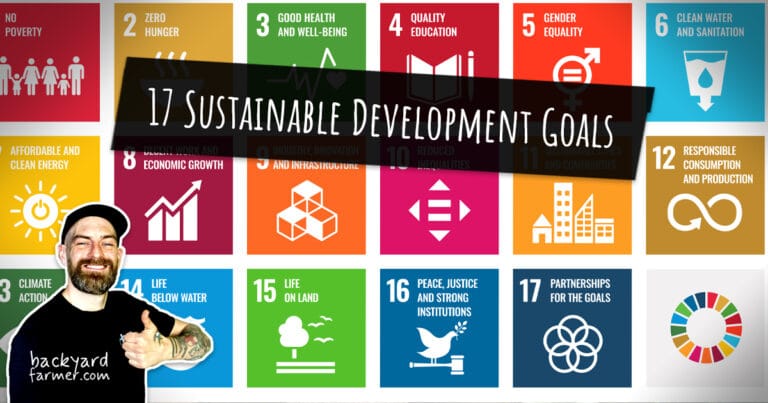Introduction
We will cover the 17 sustainable development goals established in 2015 as part of the UN’s 2030 agenda. There are 169 targets within the 17 sustainable development goals that cover what will be achieved in each sector by 2030. In this article, we will cover:
- Who created the 17 SDGs and 169 targets
- Each of the 17 goals and 169 targets
- Pdf of the 17 goals and 169 targets (free download)*
We have reviewed each point from the UN’s information and made it easier to read; please see the UN’s website for the original source material.
Who created the 17 sustainable development goals?
The 17 SDGs were set out by the UN in 2015 during the 2030 Agenda. The goals set out a pathway for countries and businesses to move towards a sustainable future. Although some goals have been achieved, things need to move faster to achieve many of the targets.
17 Sustainable Development Goals List
- #1: No Poverty
- #2: Zero Hunger
- #3: Good Health and Well-being
- #4: Quality Education
- #5: Gender Equality
- #6: Clean Water and Sanitation
- #7: Affordable and Clean Energy
- #8: Decent Work and Economic Growth
- #9: Industry, Innovation and Infrastructure
- #10: Reduced Inequality
- #11: Sustainable Cities and Communities
- #12: Responsible Consumption and Production
- #13: Climate Action
- #14: Life Below Water
- #15: Life on Land
- #16: Peace and Justice Strong Institutions
- #17: Partnerships to achieve the Goal
Explore how these global goals align with everyday sustainable practices in our article on How to Live a More Eco-Friendly and Sustainable Life.
1: No Poverty
End poverty in all its forms everywhere
- No poverty around the world. We currently measure poverty as people living on less than $1.25 daily.
- Reduce overall poverty by 50% for men, women, and children.
- Set up social protection and roll it out to as many poor or vulnerable people as possible.
- Guarantee that everyone, including vulnerable people, has equal economic rights regarding basic services, ownership and control over land and other forms of property, inheritance, natural resources, appropriate new technology and financial services, including micro-finance.
- Help reduce exposure caused by environmental or economic shock for poor or vulnerable people.
- Set up infrastructure & funding for vulnerable people in developing countries to help end poverty globally.
- Set up policies and frameworks at every level to help drive investment into projects that help people experiencing poverty worldwide.
2: End Hunger
End hunger, achieve food security and improved nutrition and promote sustainable agriculture
- End world hunger and enable access to nutritious and sufficient food year-round, focusing on the poorest and vulnerable.
- End all forms of malnutrition, especially in children under the age of five, in areas where stunting and wasting are a problem.
- Double the agricultural productivity in poor areas, particularly for women, indigenous peoples, family farmers, pastoralists and fishers.
- Maintain a diverse mix of indigenous seeds and domesticated animals, sharing any benefit from these genetic resources and traditional knowledge with the communities.
- Increase investment in rural infrastructure, agricultural research and create a fair environment for trade.
- Help stabilise food commodity markets to avoid food price volatility.
3: Good health and Well-being
Ensure healthy lives and promote well-being for all at all ages
- Reduce the death rate at childbirth to less than 70 deaths in 100,000 live births.
- To reduce the preventable deaths of newborns to 12 per 1,000 live births and children under five to 25 per 1,000.
- End epidemics worldwide, including AIDS, tuberculosis, malaria and neglected tropical diseases.
- Reduce premature deaths from cancers, cardiovascular disease, diabetes and chronic lung illnesses.
- Help reduce and prevent the afflictions of substance abuse from narcotics and alcohol.
- Halve the number of people killed in road traffic accidents.
- Guarantee everyone has access to sexual & reproductive health care services and education.
- Universal health care allows access to quality and essential health care without financial risk.
- Reduce the number of deaths caused by pollution and contamination by hazardous chemicals.
- Strengthen the WHO’s framework on Tobacco control.
- Improve legislation to allow developing countries to use and develop medical patents.
- Help develop the health care systems in developing countries, including the training and recruitment of staff.
- Improve the capacity of developing countries to detect global health risks.
4: Quality Education
Ensure inclusive and equitable quality education and promote lifelong learning opportunities for all
- Guarantee that all children receive quality education up to secondary school.
- Ensure all children have quality preschool education and are ready for primary school.
- Create equal access to affordable education after secondary education, including university.
- Develop technical skills of young adults and adults in vocational areas that lead to employment.
- Guaranteed equal access to education for all genders and vulnerable people.
- Educate people so they are capable of basic literacy and numeracy.
- Make sure sustainability is taught as part of the education people receive.
- Develop buildings and facilities used for education so that they are inclusive & safe environments.
- Offer more Scholarships to overseas students in developing countries.
- Increase the amount of trained educational staff through teacher training programmes in developing countries.
5: Gender Equality
Achieve gender equality and empower all women and girls
- End discrimination towards women and girls everywhere
- Eliminate all forms of violence and exploitation of girls and women globally.
- Remove all forms of female genital mutilation & child marriages worldwide.
- Set up infrastructure that recognises & values domestic work and care in the household as nationally appropriate.
- Guarantee reproductive rights and sexual health are accessible across the board.
- Reform policies were needed to allow women equal rights to land ownership, property, inheritance & natural resources.
- Create access to devices like computers and phones to empower women
- Strengthen and create policies that empower women and girls at all levels.
6: Clean water and sanitation
Ensure availability and sustainable management of water and sanitation for all
- Accomplish access to 100% safe and affordable drinking water for everyone.
- Accomplish access to decent sanitation and hygiene globally with particular attention to women and girls in vulnerable areas.
- Enhance water quality by improving sanitation, reducing pollution and having untreated wastewater.
- Improve water use efficiency and make sure the withdrawal of freshwater is sustainable to address issues caused by water scarcity.
- Where possible, integrate water resources across borders to help manage fresh water and reduce waste.
- Restore ecosystems that support freshwater generation and recycling, like mountains, forests, wetlands and rivers.
- Help developing countries develop their water efficiency and sanitation programmes.
- Educate and support local communities in managing water & sanitation.
7: Affordable and clean energy
Ensure access to affordable, reliable, sustainable and modern energy for all
- Guarantee complete access to affordable and sustainable energy services.
- Make sure renewable energy use is increased internationally.
- Improve energy efficiency internationally by twice as much.
- Improve relations with other countries to develop and research renewable energy solutions & remove the use of fossil fuels.
- Help developing countries gain access to improved energy solutions.
8: Decent work and economic growth
Promote sustained, inclusive and sustainable economic growth, full and productive employment and decent work for all
- Sustain and develop economic growth to boost productivity by 7% annually in developing countries.
- Improve economic productivity by diversifying, upgrading and innovating.
- Help micro, small and medium-sized businesses with policies that promote development & inspire entrepreneurship, including access to financial services.
- Make the use of resources more sustainable and remove the links between economic growth and environmental damage.
- Achieve total employment in good jobs for all individuals, including young people and the less abled.
- Reduce youth unemployment or young people not in training or education.
- End modern slavery and forced labour in all its forms.
- Ensure safety and working standards are upheld for all, including migrant workers.
- Promote local cultures & products through sustainable tourism.
- Help domestic financial institutions to improve access to banking services worldwide.
- Help developing countries benefit from trade with a support framework.
- Develop a strategy to help young people gain employment.
9: Industry, Innovation & Infrastructure
Build resilient infrastructure, promote inclusive and sustainable industrialisation and foster innovation
- Develop infrastructure to develop economic support that is inclusive, sustainable & resilient.
- Improve industry to increase employment and productivity, especially in developing countries.
- Help smaller-scale industries gain access to services that will help them grow, including affordable financial services.
- Bring infrastructure up to date with modern environmental standards across all countries.
- Improve research and development of technology that can improve the industrial sectors, focusing on developing countries.
- Help build and finance sustainable infrastructure in developing countries.
- Help developing countries develop their own technology research and development programmes.
- Help the least developed countries get online with more access to computers and phones.
10: Reduce inequalities
Reduce inequality within and among countries
- Help people on lower incomes improve their finances to a rate higher than the national average.
- Remove all social barriers so everyone has equal access to financial services and a voice in politics.
- Remove any outdated policies that may discriminate against people.
- Help implement policies that protect people’s income.
- Better regulations and monitoring of financial markets to help strengthen economies.
- Include developing countries in global politics, especially in areas that will affect them.
- Develop safe and responsible policies to ensure the safe migration of people.
- Ensure developing countries have differential treatment following the World Trade Organisation.
- Help developing countries with foreign investment to develop in areas where it’s needed most.
- Reduce the amount it costs for people to migrate safely.
11: Sustainable cities and communities.
Make cities and human settlements inclusive, safe, resilient and sustainable
- Accomplish safe and affordable housing for everyone along with essential services.
- Develop public transport that is affordable above all accessible and sustainable with particular attention to the vulnerable.
- Develop urban areas that are inclusive and sustainable with the option of settling people from other traditions.
- Allow the safekeeping of people’s cultural & natural heritage.
- Help people at risk of economic trouble after natural disasters with a focus on the world’s poorest areas.
- Make sure green spaces are accessible to all at the same time with a focus on older people and vulnerable.
- Build on economic links between rural and urban areas.
- Increase the number of cities, towns & rural areas working towards a more sustainable future.
- Help developing countries build sustainable and robust buildings using local materials.
12: Responsible consumption and production
Ensure sustainable consumption and production patterns
- Create a framework of programmes for countries on consuming and producing sustainably while developed countries taking the lead.
- Ensure that natural resources are managed and used sustainably.
- Reduce food water at consumer, retail & production levels.
- Ensure hazardous products, including disposal, are correctly dealt with throughout their life cycle.
- Reduce waste through recycling & prevention.
- Urge industry leaders to work sustainably.
- Ensure public and governmental services use sustainable services & resources.
- Guarantee that people are educated in sustainable living.
- Help developing countries move towards sustainable production & consumption.
- Create tools to help measure the impact of sustainable tourism in creating jobs and promoting local culture.
- Remove subsidies that allow companies to buy their way out of ecologically harmful practices and help protect the poorest communities.
13: Climate action
Take urgent action to combat climate change and its impacts
- Strengthen and improve defences against issues related to climate change and its effects.
- Make any changes to do with climate change into national policies, planning and strategies.
- Increase education and raise awareness about climate change and how to avoid it.
- Fulfil the promise from developed countries in the UN to organise $100 billion annually to help developing countries deal with climate-related issues.
- Create processes to generate what’s needed for proactive climate-related planning and management in developing countries.
14: Life below water
Conserve and sustainably use the oceans, seas and marine resources for sustainable development
- Reduce pollution contaminating the ocean, especially nutrient pollution and sea debris.
- Build strength and resilience in marine and coastal environments to avoid further damaging marine life and avoid the risk of adverse effects.
- Fully understand why oceans are becoming more acidic and reduce these issues.
- Implement and enforce fishing controls to allow fish stocks to return quickly.
- Create conservation areas on at least 10% of coastal habitats.
- Reform fishing regulations that may encourage overfishing or illegal fishing activities with special consideration given to developing countries.
- Help developing countries benefit economically from the sustainable use of their coasts and marine resources.
- Allow developing countries access to technology and knowledge that will help improve ocean and aquatic life conditions.
- Allow small fisheries access to commercial markets & resources.
- Improve conservation efforts and follow through with laws and frameworks implemented by UNCLOS.
15: Life On Land
Protect, restore and promote sustainable use of terrestrial ecosystems, sustainably manage forests, combat desertification, and halt and reverse land degradation and halt biodiversity loss
- Guarantee that freshwater ecosystems are put under conservation, are used sustainably and restored where necessary.
- Build on the sustainable management of all forest types worldwide and restore them where necessary.
- Help restore areas turning to desert, including areas affected by drought and floods.
- Guarantee the ecosystems and biodiversity of mountain environments to aid sustainable development.
- Act now to stop the extinction of wildlife and other biodiversity worldwide.
- Ensure all parties benefit from using plants, animals and other genetic resources.
- Act now to stop poaching activities and the illegal trafficking of wildlife or plants and address tackling the black market.
- Help prevent invasive alien species with new measures and reduce the impact caused by current priority species.
- Ensure that current planning and development processes integrate with local ecosystems and biodiversity.
- To secure funding & resources from all sectors to conserve biodiversity and use it sustainably.
- Secure finances and resources from all sectors to help manage forests and create incentives for developing countries to do the same.
- Help the fight against poaching by developing work for local communities that allow them to pursue a sustainable livelihood.
16: Peace, Justice and Strong Institutions
Promote peaceful and inclusive societies for sustainable development, provide access to justice for all and build effective, accountable and inclusive institutions at all levels
- Significantly reduce the number of deaths caused by violence globally.
- Completely eradicate the exploitation of children in all its forms.
- Encourage the rule of law nationally and internationally to establish equal rights for all.
- Primarily reduce the illegal flow of weapons and money by organised crime globally.
- Considerably reduce corruption and bribery in all their forms.
- Work towards complete transparency in institutions at all levels.
- Make confident decisions at all levels are made by inclusive and representative groups.
- Give developing countries a voice in global decision-making.
- Provide a form of legal identity, including birth registration, for everyone globally.
- Help prevent violence, terrorism and crime by building on international relationships and cooperation, with particular attention given to developing countries.
- Develop inclusive laws and policies that support sustainable development.
17: Partnerships for the Goals
Strengthen the means of implementation and revitalise the global partnership for sustainable development
Finance
- Help developing countries generate income by building infrastructure for public services.
- Fully secure the funding that developed countries committed to sharing with developing countries.
- Generate more funding from additional sources to help developing countries.
- Assist developing countries in balancing their books and helping resolve debt issues.
- Promote investment in developing countries.
Technology
- Improve the sharing of innovative technology on a regional and international level on mutual terms with developing nations.
- Give developing countries access to green technology on favourable terms.
- Help developing countries with technology and enable them to become self-sufficient with the help of computers, phones and other communication technology.
Capacity building
- Increase international help to developing countries to implement sustainable development goals.
Trade
- Encourage a fair global trade system under the World Trade Organisation.
- Help developing countries increase their exports.
- Allow developing countries access to duty-free and quota-free markets with preferential treatment to help them develop.
Systemic issues
Policy and institutional coherence
- Improve the stability of smaller economies through developing local policies.
- Improve clarity on policies for sustainable development.
- Approach nations respectfully to help establish policies to eradicate poverty and promote sustainable development.
Multi-Stakeholder partnerships
- Improve the global collaboration between countries in all areas to help establish sustainable development worldwide.
- Help build effective partnerships between public, private & civil sectors.
Data, monitoring and accountability
- Improve the availability of quality data from developing countries that can be used nationally.
- Improve existing data collection initiatives on sustainable development.
Download the 17 Sustainable Developments PDF
If you need the 17 Sustainble Development goals as a PDF document you are in luck! You can download this document right here, if it’s saved you some time please feel free to ‘Buy me a Coffee’, TIA!
Sources: Envision 2030, United Nations Sustainable Development Goals





